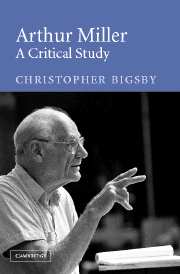Book contents
- Frontmatter
- Contents
- Acknowledgements
- Note on the text
- Introduction
- 1 The Michigan plays
- 2 The Golden Years, The Half-Bridge, Boro Hall Nocturne
- 3 The radio plays
- 4 The Man Who Had All the Luck
- 5 Focus
- 6 All My Sons
- 7 Death of a Salesman
- 8 Arthur Miller: time-traveller
- 9 An Enemy of the People
- 10 The Crucible
- 11 A Memory of Two Mondays
- 12 A View from the Bridge
- 13 Tragedy
- 14 The Misfits
- 15 After the Fall
- 16 Incident at Vichy
- 17 The Price
- 18 The Creation of the World and Other Business
- 19 The Archbishop's Ceiling
- 20 Playing for Time
- 21 The shearing point
- 22 The American Clock
- 23 The one-act plays: Two-Way Mirror, and Danger: Memory!
- 24 The Ride Down Mount Morgan
- 25 The Last Yankee
- 26 Broken Glass
- 27 Mr Peters' Connections
- 28 Resurrection Blues
- 29 Finishing the Picture
- 30 Fiction
- 31 Arthur Miller as a Jewish writer
- Notes
- Index
13 - Tragedy
Published online by Cambridge University Press: 16 November 2009
- Frontmatter
- Contents
- Acknowledgements
- Note on the text
- Introduction
- 1 The Michigan plays
- 2 The Golden Years, The Half-Bridge, Boro Hall Nocturne
- 3 The radio plays
- 4 The Man Who Had All the Luck
- 5 Focus
- 6 All My Sons
- 7 Death of a Salesman
- 8 Arthur Miller: time-traveller
- 9 An Enemy of the People
- 10 The Crucible
- 11 A Memory of Two Mondays
- 12 A View from the Bridge
- 13 Tragedy
- 14 The Misfits
- 15 After the Fall
- 16 Incident at Vichy
- 17 The Price
- 18 The Creation of the World and Other Business
- 19 The Archbishop's Ceiling
- 20 Playing for Time
- 21 The shearing point
- 22 The American Clock
- 23 The one-act plays: Two-Way Mirror, and Danger: Memory!
- 24 The Ride Down Mount Morgan
- 25 The Last Yankee
- 26 Broken Glass
- 27 Mr Peters' Connections
- 28 Resurrection Blues
- 29 Finishing the Picture
- 30 Fiction
- 31 Arthur Miller as a Jewish writer
- Notes
- Index
Summary
In turning to tragedy Miller was remembering the lessons he had learned back in Michigan when he had studied a Greek theatre for which the tragic and the political were closely allied. Athenian tragedy, as Paul Cartledge observes, was in a straightforward and broad sense political, and here was the segue between Miller's student social dramas of the 1930s and the ‘tragedies’ of the 1940s and 50s. The writer of tragedies was a civics teacher. Greek theatre had offered a drama of ideas able, as Cartledge suggests, to challenge social norms.
Miller also seems to have responded to a Hegelian sense of the tragic, which refracted its seemingly irremediable determinism in the direction of a social ethic, of active characters fully responsible for their actions. Here was an existential twist that managed, it seemed, to accommodate social concern to a personal ethic. For Hegel, ‘To genuine tragic action it is essential that the principle of individual freedom and independence, or at least that of self-determination, the will to find in the self the free cause and source of the personal act and its consequences, should already have been aroused.’ This individual, though, could be seen as in some way containing the social tensions of the culture and hence be at least tangentially related to the Marxism that had yet entirely to leave Miller's bloodstream.
- Type
- Chapter
- Information
- Arthur MillerA Critical Study, pp. 198 - 212Publisher: Cambridge University PressPrint publication year: 2004



